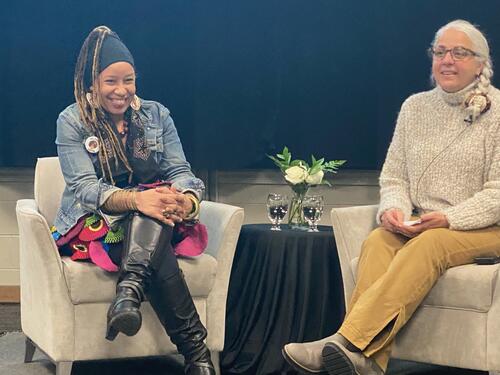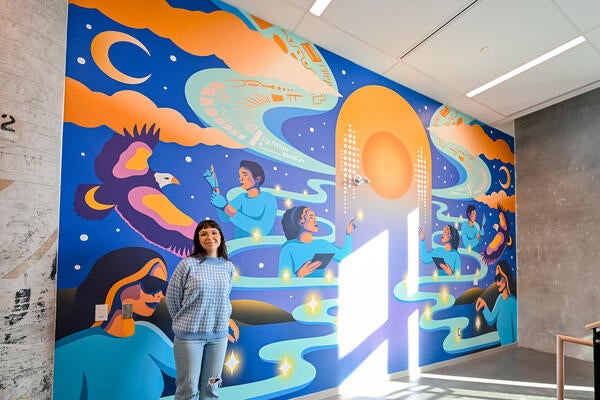
A candid discussion with Dr. Laura Mae Lindo
Barriers to equity: Women, political representation and family

Barriers to equity: Women, political representation and family
By Tracelyn Cornelius University RelationsWomen face significant barriers when it comes to achieving equity, particularly in politics. Dr. Laura Mae Lindo, the Kitchener Centre Member of Provincial Parliament, addressed these issues at a recent event, as part of an International Women's Day (IWD) series, hosted and organized by the University of Waterloo, in collaboration with the Women in Communications and Technology Waterloo Region Chapter (WCT WR).
Speaking at the March 1 discussion called Barriers to equity: Women, political representation & family, Lindo shared personal experiences of being a Black, single parent involved in politics.
She highlighted that identifying and addressing barriers to equity for women is particularly timely and relevant as Canada strives to create a more equitable society, not just for women, but for everyone.
“Women face various barriers when it comes to achieving equity,” she said. “There is a need for a deeper understanding of the barriers that prevent racialized women from advancing in the system. This involves collecting and analyzing data on why women fail to advance, recognizing the intersectional identities of women and having meaningful conversations about these issues.”
Lindo recently announced that she was leaving politics in July to join the University of Waterloo as a faculty member in the department of Philosophy in Fall 2023. Addressing her reasons for resigning, Lindo revealed that while she did experience racism as Kitchener’s first Black MPP, a lack of childcare was the primary reason for her resignation.
Lindo emphasized that childcare is not just a problem for women or racialized women, but an every-person problem that needs to be addressed. She encouraged people to face barriers publicly, saying that the more they do so, the more likely change will happen.
“While research shows that Black single women face significant barriers due to childcare, a lack of affordable childcare is a barrier to advancement for everyone,” she said. “I hope that by raising awareness about childcare as a barrier, real change can happen.”
Lindo also emphasized the need to transform education and pedagogy. She said that she will be bringing a deep equity lens to her new role as a philosophy professor at Waterloo. The incoming professor is a Black Cluster hire, an initiative created to increase the representation of Black faculty members to address the systemic underrepresentation of Black scholars at the University and to be more representative of the student body being served.
Before entering politics in 2018, Lindo was a former director of Equity at Wilfrid Laurier University. She also holds a Masters and a PhD in Education from York University.

In December 2021, the MPP tabled Bill 67, The Racial Equity in Education Systems Act, which would recognize the existence of systemic racism and discrimination in schools and post-secondary institutions and require educational institutions to create racial equity plans. Lindo re-tabled the Bill in August 2022 with co-sponsors MPP Lise Vaugeois and MPP Jill Andrew.
Now called Bill 16, the Racial Equity in the Education System Act was scheduled to be debated in November 2022, but Lindo’s father passed away that same month and the Bill was rescheduled. Lindo, whose resignation as MPP comes into effect in July looks forward to the debate being rescheduled.
The discussion on Barriers to equity: Women, political representation & family was moderated by Dr. Jasmin Habib, Chair of the Political Science Department at the University of Waterloo.
Building on the collaboration established during the IWD 2021 and 2022 WCT WR is partnering with community organizations to present IWD events throughout the month of March 2023 that focus on the theme: Embrace Equity.
To learn more about more and to register for other events, please visit the IWD Waterloo Region events page.

Read more
Meet the multidisciplinary team tackling the multi-faceted challenge of sustainable aeronautics

Read more
Sport and Recreation Management student Diane Choi embarks on co-op term with the Canadian Olympic Committee

Read more
Many Hearts, One Mind by Indigenous artist Alanah Jewell celebrates the act of creation shared by the Land and innovators in our community
The University of Waterloo acknowledges that much of our work takes place on the traditional territory of the Neutral, Anishinaabeg, and Haudenosaunee peoples. Our main campus is situated on the Haldimand Tract, the land granted to the Six Nations that includes six miles on each side of the Grand River. Our active work toward reconciliation takes place across our campuses through research, learning, teaching, and community building, and is co-ordinated within the Office of Indigenous Relations.